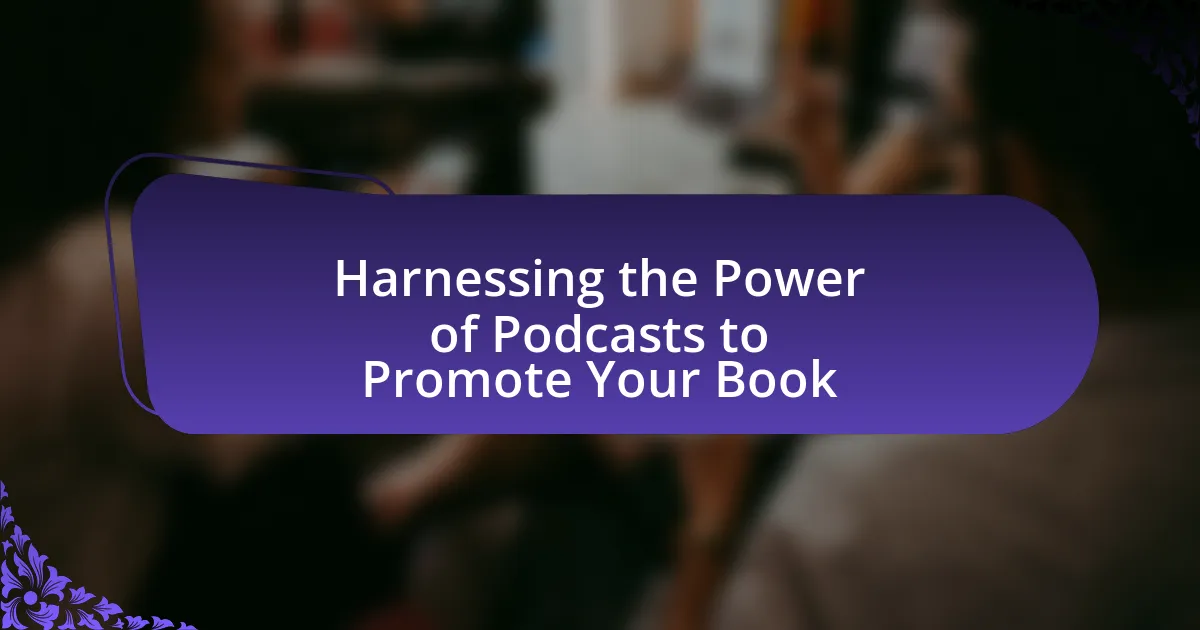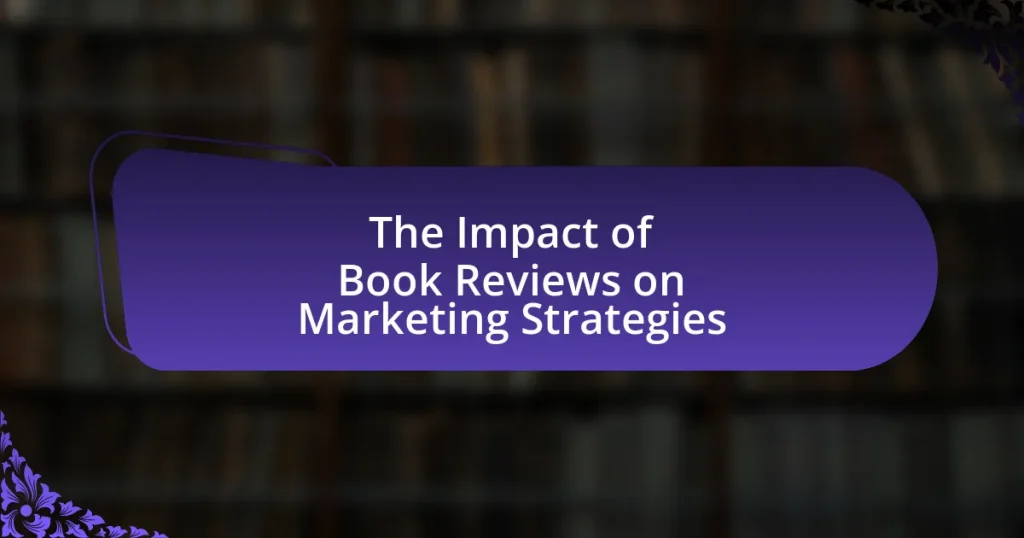Harnessing the power of podcasts to promote a book involves leveraging the popularity of audio content to engage a wider audience and enhance visibility. The article outlines how authors can utilize podcasts as a promotional tool by sharing insights about their work, connecting with listeners, and building a personal brand. It discusses the unique advantages of podcasts over traditional marketing, including deeper audience engagement and lower costs. Additionally, the article provides strategies for authors to effectively promote their books through podcasts, identify suitable shows, prepare for interviews, and measure the success of their promotional efforts. Common pitfalls to avoid and practical follow-up strategies are also highlighted to maximize the impact of podcast appearances.
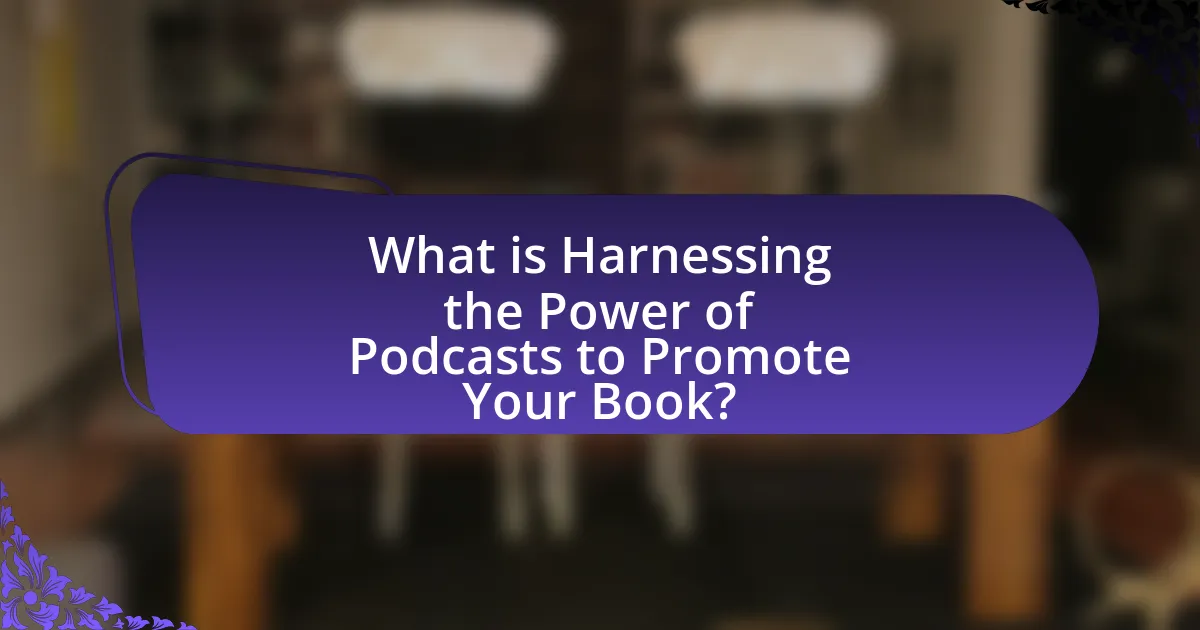
What is Harnessing the Power of Podcasts to Promote Your Book?
Harnessing the power of podcasts to promote your book involves utilizing the growing popularity of audio content to reach a wider audience and engage potential readers. Podcasts provide an intimate platform where authors can discuss their work, share insights, and connect with listeners, thereby increasing visibility and interest in their books. According to a 2021 report by Edison Research, 41% of Americans aged 12 and older have listened to a podcast in the past month, indicating a significant audience for authors to tap into. By appearing as a guest on relevant podcasts or creating their own, authors can leverage this medium to build a personal brand, foster community engagement, and drive book sales effectively.
How can podcasts serve as a promotional tool for authors?
Podcasts can serve as a promotional tool for authors by providing a platform to reach a targeted audience and engage listeners through discussions about their work. By appearing as guests on relevant podcasts, authors can share insights about their writing process, themes in their books, and personal stories that resonate with potential readers. This method not only increases visibility but also builds a personal connection with the audience, which can lead to higher book sales. According to a 2021 report by Edison Research, 41% of Americans aged 12 and older have listened to a podcast in the past month, indicating a significant and growing audience that authors can tap into for promotion.
What unique advantages do podcasts offer compared to traditional marketing?
Podcasts offer unique advantages over traditional marketing by providing a more intimate and engaging medium for storytelling. This format allows for deeper connections with audiences, as listeners often develop a sense of trust and loyalty towards podcast hosts. According to Edison Research, 54% of podcast listeners are more likely to consider brands advertised on their favorite podcasts, highlighting the effectiveness of this medium in influencing consumer behavior. Additionally, podcasts have a lower cost of entry compared to traditional advertising channels, enabling authors to reach niche audiences without significant financial investment. This accessibility, combined with the ability to create serialized content, allows for sustained engagement and ongoing conversations with listeners, further enhancing promotional efforts.
How do podcasts engage audiences differently than other media?
Podcasts engage audiences differently than other media by fostering a more intimate and personal connection through audio storytelling. This medium allows listeners to consume content while multitasking, which enhances accessibility and convenience. According to Edison Research, 55% of podcast listeners report feeling a personal connection to the hosts, a level of engagement that is often less pronounced in visual or text-based media. Additionally, the episodic nature of podcasts encourages ongoing engagement, as audiences are more likely to subscribe and return for new content, creating a loyal listener base that is less common in traditional media formats.
Why should authors consider using podcasts for book promotion?
Authors should consider using podcasts for book promotion because podcasts reach a diverse and engaged audience, providing a platform for deeper connection with potential readers. The podcasting industry has grown significantly, with over 2 million active podcasts and more than 48 million episodes available, indicating a vast audience eager for content. Additionally, listeners often develop a strong loyalty to podcast hosts, which can translate into trust for the authors featured on those shows, enhancing the likelihood of book purchases. Research shows that 54% of podcast listeners are more likely to consider products or services mentioned in podcasts, making it a strategic avenue for authors to increase visibility and sales.
What are the potential reach and audience demographics of podcasts?
Podcasts have the potential to reach over 100 million listeners in the United States alone, with a diverse audience demographic that includes a wide range of age groups, educational backgrounds, and interests. According to Edison Research’s “The Infinite Dial 2023,” 41% of Americans aged 12 and older have listened to a podcast in the past month, with the highest engagement among individuals aged 18-34, who represent 50% of the audience. Additionally, 45% of podcast listeners have a college degree, indicating a well-educated demographic. This broad reach and varied audience make podcasts an effective platform for promoting books across different genres and topics.
How can podcasts enhance an author’s personal brand?
Podcasts can enhance an author’s personal brand by providing a platform for direct engagement with their audience. This medium allows authors to share their insights, discuss their works, and connect on a personal level, which fosters a sense of community and loyalty among listeners. According to a 2021 report by Edison Research, 41% of Americans aged 12 and older have listened to a podcast in the past month, indicating a growing audience that authors can tap into. By consistently appearing on podcasts or hosting their own, authors can establish themselves as thought leaders in their genre, increase their visibility, and ultimately drive book sales.
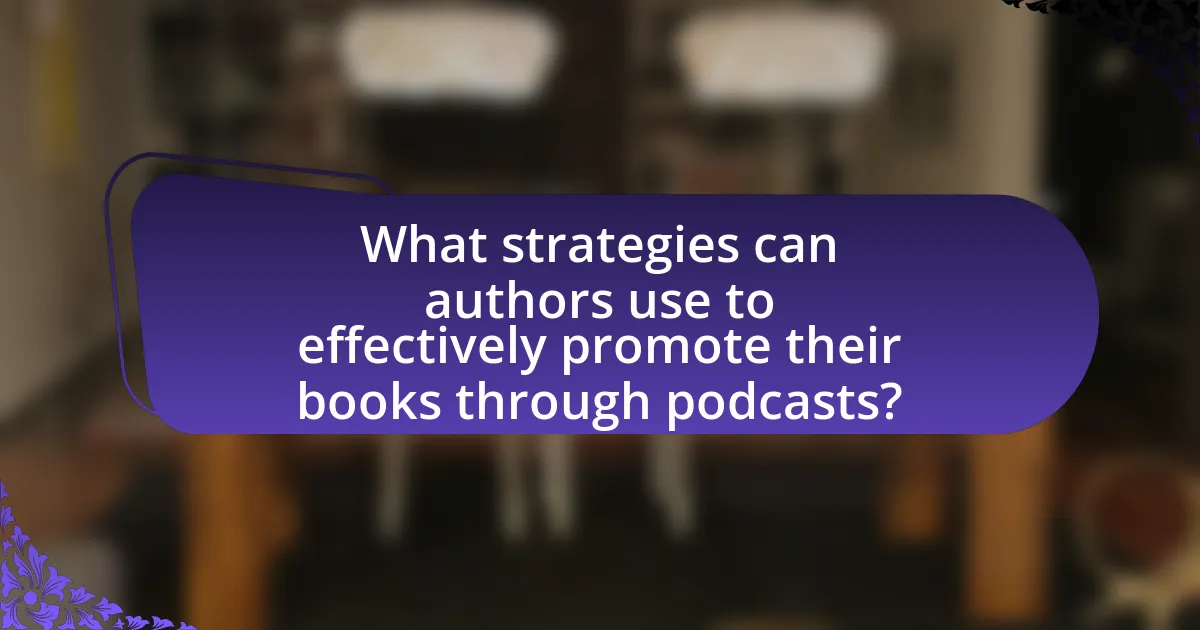
What strategies can authors use to effectively promote their books through podcasts?
Authors can effectively promote their books through podcasts by leveraging guest appearances, creating their own podcast, and utilizing social media for engagement. Guest appearances on established podcasts allow authors to reach new audiences and share insights about their books, which can lead to increased interest and sales. Creating their own podcast enables authors to build a dedicated listener base, where they can discuss themes related to their books, interview other authors, and engage with their audience directly. Additionally, promoting episodes through social media platforms enhances visibility and encourages listeners to explore the author’s work. According to a 2021 report by Edison Research, 41% of Americans aged 12 and older have listened to a podcast in the past month, indicating a growing audience that authors can tap into for book promotion.
How can authors identify the right podcasts for their book promotion?
Authors can identify the right podcasts for their book promotion by researching podcasts that align with their book’s genre and target audience. This involves analyzing podcast content, listener demographics, and engagement levels to ensure a good fit. For instance, authors can use platforms like Listen Notes or Podchaser to search for podcasts by keywords related to their book’s themes. Additionally, examining the podcast’s previous guests and topics can provide insight into whether the podcast attracts an audience interested in the author’s subject matter. This targeted approach increases the likelihood of reaching potential readers effectively.
What criteria should authors use to select podcasts that align with their genre?
Authors should select podcasts based on audience demographics, content relevance, and engagement metrics. Audience demographics ensure that the podcast’s listeners match the author’s target readership, which increases the likelihood of reaching potential readers. Content relevance involves assessing whether the podcast’s themes and topics align with the author’s genre, as this connection fosters authentic discussions. Engagement metrics, such as listener reviews and social media interactions, provide insight into the podcast’s influence and reach, indicating how effectively the author can promote their book. For instance, a podcast with a strong following in the fantasy genre would be ideal for an author of fantasy novels, as it directly connects the author with an interested audience.
How can authors research the audience of potential podcasts?
Authors can research the audience of potential podcasts by analyzing listener demographics, engagement metrics, and content themes. Tools like Podchaser and Listen Notes provide insights into audience size, listener interests, and podcast ratings, allowing authors to identify which podcasts align with their target readership. Additionally, reviewing social media interactions and listener reviews can reveal audience preferences and engagement levels, further informing authors about the suitability of specific podcasts for promoting their books.
What are the best practices for appearing as a guest on a podcast?
To effectively appear as a guest on a podcast, preparation is essential. Research the podcast’s audience and format to tailor your message accordingly. Engaging storytelling and clear communication of your book’s themes will resonate with listeners. Additionally, practicing your key points ensures a confident delivery. According to a study by Podchaser, 70% of podcast listeners are more likely to purchase a book recommended by a podcast host, highlighting the importance of a compelling presentation.
How can authors prepare for a podcast interview to maximize impact?
Authors can prepare for a podcast interview to maximize impact by researching the podcast’s audience and tailoring their message accordingly. Understanding the demographics and interests of the listeners allows authors to connect their content to what resonates with the audience, enhancing engagement. Additionally, authors should outline key talking points that highlight their book’s themes and unique selling propositions, ensuring they communicate their message clearly and effectively. Practicing responses to potential questions can also help authors articulate their thoughts confidently during the interview. According to a study by the Podcast Host, 75% of listeners prefer interviews that feel conversational, emphasizing the importance of preparation in creating a natural dialogue.
What key messages should authors convey during their podcast appearances?
Authors should convey their unique insights and the core themes of their books during podcast appearances. This approach helps to engage listeners and create a connection with potential readers. By sharing personal anecdotes or experiences related to their writing journey, authors can illustrate the relevance of their work. Additionally, discussing the impact of their book on readers or society can enhance its perceived value. For instance, a study by the Pew Research Center indicates that storytelling significantly influences audience engagement, making it a powerful tool for authors to utilize in podcasts.
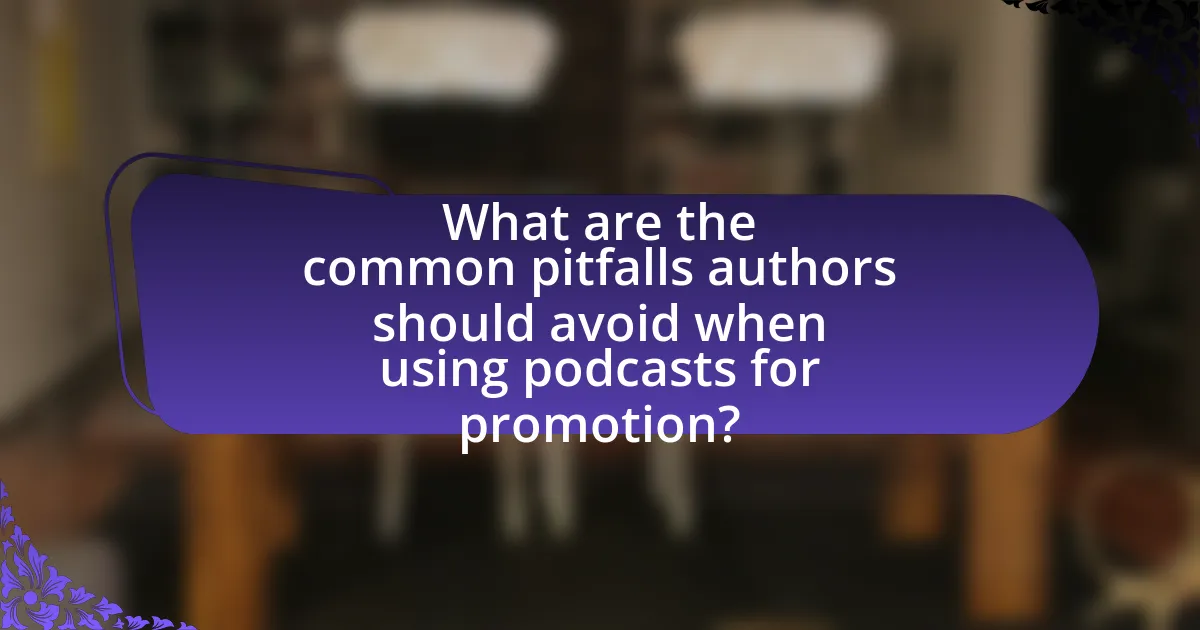
What are the common pitfalls authors should avoid when using podcasts for promotion?
Authors should avoid several common pitfalls when using podcasts for promotion. One major pitfall is failing to research the podcast’s audience, which can lead to misalignment between the author’s message and the listeners’ interests. For instance, promoting a romance novel on a podcast focused on technology may not resonate with the audience, resulting in wasted effort. Another pitfall is neglecting to engage with the host and their audience, which can diminish the effectiveness of the promotion; authors should aim to build a rapport and provide value to listeners. Additionally, over-promoting their work can alienate the audience; instead, authors should focus on storytelling and sharing insights related to their book. Lastly, not having a clear call to action can lead to missed opportunities for audience engagement, as listeners may not know how to find the author’s work. These pitfalls can hinder the overall success of a podcast promotion strategy.
What mistakes do authors often make when promoting their books on podcasts?
Authors often make the mistake of failing to tailor their message to the podcast audience, which can lead to disengagement. When authors do not research the podcast’s theme or listener demographics, they miss the opportunity to connect their book’s content to the interests of the audience. Additionally, authors frequently focus too much on self-promotion rather than providing valuable insights or engaging stories, which can turn listeners away. According to a study by the Podcast Host, 70% of listeners prefer content that is informative and entertaining over direct sales pitches. This indicates that a lack of audience awareness and an overemphasis on promotion can significantly hinder the effectiveness of book promotion on podcasts.
How can authors avoid coming across as overly promotional?
Authors can avoid coming across as overly promotional by focusing on providing valuable content rather than solely promoting their work. Engaging in meaningful conversations, sharing insights related to their expertise, and discussing relevant topics can create a connection with the audience. For instance, authors can share personal stories or experiences that relate to their book’s themes, which fosters authenticity and relatability. Research indicates that audiences respond better to content that offers value, with a study by the Content Marketing Institute showing that 70% of consumers prefer to learn about a company through articles rather than advertisements. This approach not only builds trust but also encourages organic interest in the author’s work without overtly pushing for sales.
What are the risks of not researching a podcast before appearing?
Not researching a podcast before appearing poses significant risks, including misalignment with the podcast’s audience and values. This misalignment can lead to ineffective communication, where the guest’s message fails to resonate with listeners, ultimately diminishing the promotional impact for the book. Additionally, a lack of understanding of the podcast’s format and style may result in an uncomfortable or unprofessional appearance, which can harm the guest’s reputation. For instance, appearing on a podcast that promotes controversial views without prior knowledge can lead to public backlash, damaging the author’s credibility and brand.
How can authors measure the success of their podcast promotional efforts?
Authors can measure the success of their podcast promotional efforts by analyzing key performance indicators (KPIs) such as listener engagement, download statistics, and conversion rates. Listener engagement can be assessed through metrics like social media interactions, comments, and shares related to the podcast episodes. Download statistics provide insight into how many times episodes are accessed, which can indicate the reach and popularity of the promotional content. Conversion rates, which track how many listeners take specific actions such as visiting an author’s website or purchasing a book after listening, offer a direct measure of the effectiveness of the promotional strategy. For example, a study by Edison Research found that 54% of podcast listeners reported being more likely to purchase a product after hearing about it on a podcast, highlighting the potential impact of effective promotional efforts.
What metrics should authors track to evaluate the effectiveness of their podcast appearances?
Authors should track listener engagement metrics, such as downloads, listens, and shares, to evaluate the effectiveness of their podcast appearances. These metrics provide insight into how many people are consuming the content and how it resonates with the audience. For instance, a study by Edison Research found that 54% of podcast listeners reported taking action after hearing a podcast ad, indicating that engagement metrics can directly correlate with audience response and potential book sales. Additionally, tracking social media mentions and website traffic following an appearance can further demonstrate the impact of the podcast on the author’s visibility and reach.
How can authors gather feedback from podcast listeners about their book?
Authors can gather feedback from podcast listeners about their book by encouraging direct engagement through various channels. They can create dedicated social media pages or groups where listeners can share their thoughts and reviews. Additionally, authors can include a call-to-action in their podcast episodes, prompting listeners to leave feedback via email or on platforms like Goodreads. Research indicates that interactive engagement methods, such as polls or surveys shared during episodes, can significantly increase listener participation and feedback quality. For instance, a study by the Pew Research Center found that 64% of podcast listeners are likely to engage with content that invites their input, demonstrating the effectiveness of these strategies.
What practical tips can authors implement to maximize their podcast promotion efforts?
Authors can maximize their podcast promotion efforts by actively engaging with their audience through social media, collaborating with other podcasters, and creating compelling content that resonates with listeners. Engaging on platforms like Twitter and Instagram allows authors to share podcast episodes, interact with fans, and build a community around their work. Collaborating with other podcasters can expand reach, as it introduces the author to new audiences who may be interested in their books. Additionally, creating content that includes storytelling elements or behind-the-scenes insights can captivate listeners, making them more likely to seek out the author’s work. These strategies are supported by the fact that podcasts with strong social media engagement see a 20% increase in listener retention, according to a study by Edison Research.
How can authors create engaging content that resonates with podcast audiences?
Authors can create engaging content that resonates with podcast audiences by focusing on storytelling, authenticity, and audience interaction. Storytelling captivates listeners, as research shows that narratives can enhance memory retention by up to 22 times compared to facts alone. Authenticity builds trust; audiences are more likely to connect with genuine voices, as evidenced by a 2021 survey indicating that 70% of podcast listeners prefer hosts who share personal experiences. Additionally, encouraging audience interaction through Q&A sessions or social media engagement fosters a sense of community, which can increase listener loyalty and engagement.
What follow-up strategies should authors use after appearing on a podcast?
Authors should implement several follow-up strategies after appearing on a podcast to maximize their exposure and engagement. First, authors should send a thank-you email to the podcast host, expressing gratitude for the opportunity and reinforcing the relationship. This gesture can lead to future collaborations and strengthens networking ties.
Next, authors should share the podcast episode across their social media platforms, tagging the host and using relevant hashtags to increase visibility. This action not only promotes the episode but also engages the author’s audience, potentially attracting new listeners.
Additionally, authors can create a blog post summarizing key points discussed in the podcast, providing further insights and encouraging readers to listen to the episode. This strategy enhances the author’s content marketing efforts and drives traffic to both the blog and the podcast.
Finally, authors should monitor listener feedback and engage with comments or questions that arise from the episode. This interaction fosters community and can lead to deeper connections with the audience. By employing these strategies, authors can effectively leverage their podcast appearances to promote their books and expand their reach.
